SHANKS, Clara
Clara Shanks, a sweet, well-loved, appreciated and thought-of, was found missing by her family - they looked for hours then called in recruits from the neighboring area. Her body was found (head bashed in still bleeding from her mouth and nose) in the nearby stream. It was fairly well a done-deal that the Keller family who lived next door and who Clara had told her mother that the husband had made bad passes at her were the culprits but after a lengthy trial, they went scot-free. Read about this poor lady below! Her photo and her brother's are from the Ft. Wayne Journal-Gazette 1 Sept 1895 p4
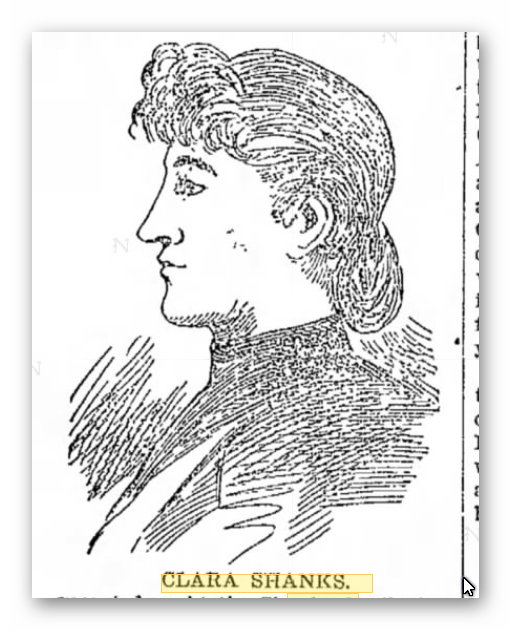
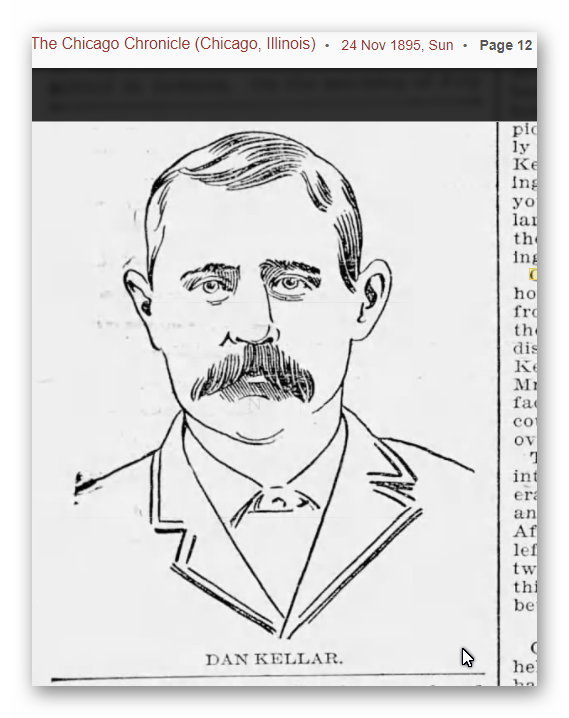
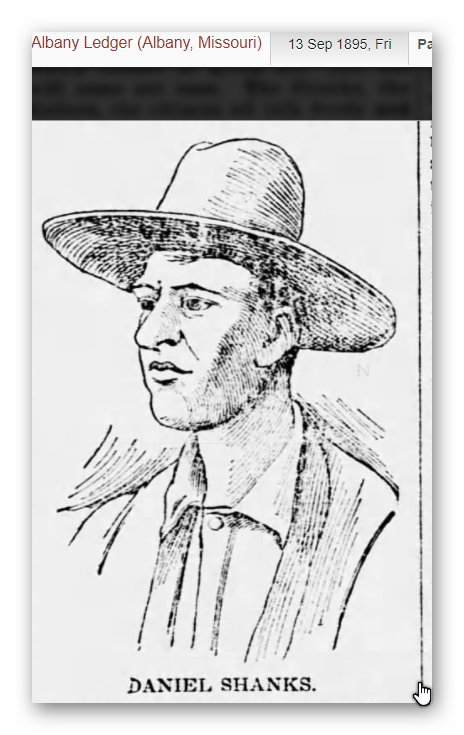
Source: Indianapolis News Thursday 12 Sept 1895 p 3
Rockville, Sept 11 - The Parke County grand jury which has been taking evidence in the Clara Shanks murder case for over a week, came into court today and returned a bill of sealed indictments against Daniel Kellar, his wife Nancy and sister Margaret. When the three prisoners were brought into court for arraignment attorney McCabe for the defense, filed a motion to quash the several indictments. This will be given a hearing Friday. There are 9 distinct indictments jointly against Dan Kellar, his wife and sister for murder in the first degree. The difference in them is in the specific means alleged to have been used by the Kellar sin the killing of Clara Shanks on July 6 at Wolf Creek Falls. When the three prisoners were brought into court they showed the effects of the dreadful strain of three weeks' imprisonment since the preliminary hearing at Annapolis, nearly four weeks ago. All have aged terribly, but Sheriff Mull says none have given the slightest evidence of guilt. The finding of the lifeless body of Clara Shanks in Wolf Creek Falls on Sunday July 7 which remained an impenetrable mystery for over five weeks is now shaping itself in the greatest murder trial in the history of the two counties.Prosecuting Attorney Maxwell, attorneys Sims & Nebeker of Covington and Puett & McFadden of Rockville will represent the State, while the defence will be supplied by Charles McCabe of Covington and Rice and Johnston of Rockville.
Source: Albany, Missouri Fri 13 Sept 1895 p 7
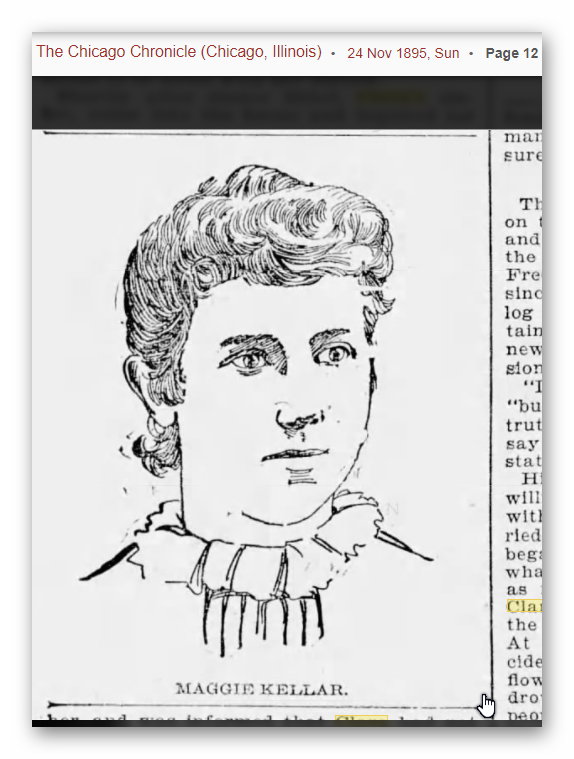
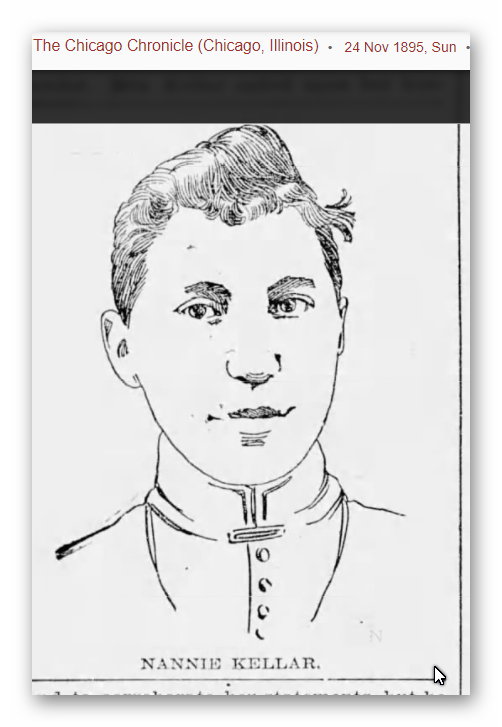
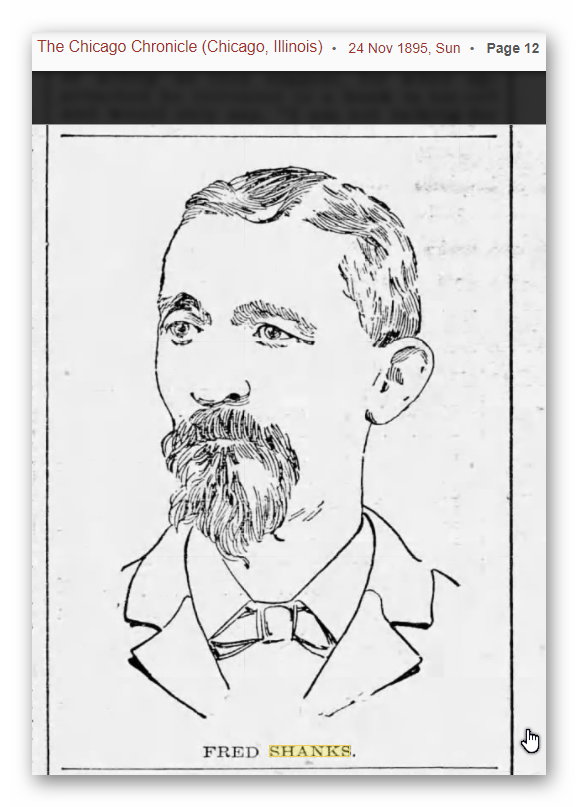
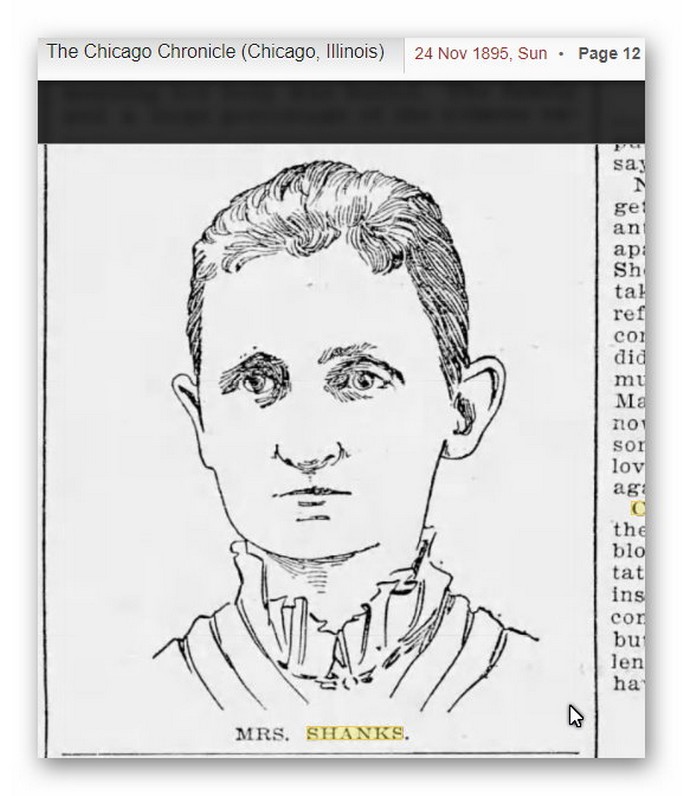
Bloomingdale, Ind correspondence – The murder of Clara Shanks, which has been exciting Parke and Fountain counties for several weeks, is still shrouded in as great mystery as on the morning her lifeless body was taken from Wolf Creek falls. Three of the shrewdest criminal attorneys of the two counties, two detectives of more than local reputation, all assisted by a vigilance committee comprising a dozen of the best farmers of the neighborhood, have worked day and night on the case trying to find sufficient evidence for a conviction of the guilty parties, but the plot seems to be a fit subject for the pen of a novelist. Clara Shanks was the beautiful 18-year-old daughter of Frederick Shanks. She was the third child of six, and was in many ways the star of that rural home. The Shanks place is one mile north of Grange Corner and just over the county line in Fountain County. Just across the road in Parke County is the home of Daniel Keller. During the recent drought the Shanks family has been carrying water from the Keller place and it usually fell to Clara Shanks to do this. These frequent trips to the Kellers led to a suspicion on the part of Mrs. Keller that a flirtation had sprung up between Clara and her husband. Her jealous nature became excited and her opinion was soon magnified to such an extent that she believed there had been improper relations between her husband and Clara. The latter’s two youngest brothers had an idea that their sister liked Dan Keller and whenever they would see him out in his barnyard they would taunt their sister with such remarks as , “Clara, there goes your feller.” Daniel Shanks, the oldest brother heard of Mrs. Keller’s allegations and on the evening of July 5 he went over to their place to investigate. Mrs. Keller told him of her suspicions and that Clara must not be allowed to come for water. Other members of the family could come, but she must not come into their yard. Next morning about 11 o’clock, Mrs Keller, her sister, Miss Emma Dox and her husband, Daniel went out to the rail fence at the road separating the two houses to make up the difficulty. They called for Clara to come to the door, but her brother Dan would not let her go. Mrs. Shanks responded and there in the open dooryard the charges were told the mother, who declared that she did not believe them. To this Mrs. Keller turned to her husband with this: “Will you let them deny what I say?” This scene ended, the Shanks family went back into the house. At 12 o’clock the family sat down to dinner, and there for the first time the father, Frederick, was told of the allegations made by Mrs. Keller. Mrs. Shanks turning to her daughter said, “Clara what about this?” The daughter denied all the charges, and then a profound silence settled over that dinner table. Clara could not eat and in a few minutes got up and left the table, that being the last time the family saw her alive. She left the house, but no one thought to notice her. By 12 o’clock the mother became uneasy and sent the children out to look for the girl. Daniel Keller was in his barnyard at the time and seeing the children searching the premises he shouted to them: “If you are looking for Clara, I saw her going down the lane more than an hour ago.” The Shanks family hunted the Wolf Creek thicket for their daughter that afternoon, but notwithstanding that … Mrs. Shanks testified before the coroner’s jury that she always thought Clara was in Wolf Creek falls, they never looked for her there, and at 5 o’clock gave up the search. No neighbors had been called in and at an early hour the family retired as usual. Next morning at 5 o’clock Mrs. Shanks called her son Daniel and told him that she had dreamed all night of seeing Clara strangling in the pool at the foot of Wolf Creek falls. Young Shanks ran to the pool, which is a half mile away, took off his clothing and waded in. He found the body in 5’ of water and without making any effort to get it out, he put on his clothing and came back to the house. Taking his Winchester shotgun he walked directly over to the Kellers’ front gate and called Daniel Keller t the door. “Clara is drowned in Wolf Creek Falls and you caused it,” exclaimed the enraged man. He threw up his gun and fired twice at Keller who was standing in the door, but owing to his nervousness the shot was too low, burying itself in the door sill. Keller sprung back and his wife came back begging young Shanks to desist. A neighbor, James Rice, appeared and took Shanks home. The community was roused, and the lifeless body was taken from the pool to the Shanks home. Coroner Young of Fountain County, assisted by Dr. AL Spinnings of Wallace made a hasty examination and returned a verdict of suicide by drowning. The same day Daniel Keller went to Rockville and swore out a warrant against Dan Shanks for an unprovoked assault. Deputy Sheriff McLain proceeded to the scene to arrest Shanks, but upon his arrival found the home surrounded by a mob of 300 excited men, who informed the sheriff that if he arrested Shanks they would hang Keller. The sheriff took in the situation and returned his warrant unserved. Clara Shanks was buried in the old Zackmire cemetery the next day, but the public was not satisfied. The suspicion was so strong against Keller that there was danger of mob violence, so the family left their own residence and have since lived with their brother, George across the Mill Creek valley. A vigilance committee was organized and began holding secret meetings at an old schoolhouse just east of Grange Corner, It became the universal verdict of the settlement that Clara Shanks was murdered and afterward thrown into the pool, which is some 40 x 20’ with 5 and 6’ of water the year round. Ten days after the burial a post mortem examination was ordered, seven competent physicians chosen from both Fountain and Parke Counties doing the work. They found several heavy bruises about the head, a congested state of the brain with an entire dislocation of the head at the base of the skull. The larynx and lungs were free and there was no sign of strangling. A careful examination disclosed the fact that the dead girl had no cause for secret shame, which had been the basis for all suicidal theories. The unaminous verdict of the 7 physicians was: “We find that Clara Shanks met her death in violence; sources unknown.” The weight of the evidence brought out by Attorney McCabe and the Kellers was to fix the murder of Clara in her own family. They all stated that they believed the girl had been murdered, but by whom they did not know. It was held that the Shanks family located the body entirely too easy not to know something of how it came there. The dream of Mrs. Shanks was thought to be too realistic to come from a sleeping brain. Also the Kellers testified to having seen young Shanks cross the field to the Wolf Creek thicket twice during the afternoon, once on a run and at night all retired as though nothing had happened. Here this strange mystery rests. Attorney Thomas says there is evidence which cannot be given out yet, but will come out soon. ,The Shanks, the Kellers, the citizens all talk freely and all cry for justice, and all firmly believe light will be soon thrown on the dark plot. No more fitting place in all Parke or Fountain counties could have been found for such a deed than this weird place called Wolf Creek Falls. The entire valley is a book of romance and mystery. Named by the red man Wolf creek, it has come down loaded with traditions. More Indian relics have been found here than any place in the country: Indian kettles can be seen at every turn in the rocky gorge, while an old Indian grave is to be found on the high cliff overlooking the falls. Last Sunday 500 persons visited the scene of the tragedy and one week before 700 person drove down the hollow to see the pool where the body of Clara Shanks was found. The interest grows as the case is being unraveled.
Source: Chicago Chronicle Sun 24 Nov 1895 p 12
Wallace, Indiana Nov 23 – Daniel Kellar, his wife Nannie and Maggie his sister who have been languishing in the county jail at Rockville since Last July, charged with murdering Clara Shanks, will be arraigned for trial in the circuit court of Parke County next Tuesday and again will be brought to the public mind what appears to be one of the most atrocious crimes ever committed in Indiana. On the morning of July 7 the body of Clara Shanks was found in the pool formed by the fall of the waters of Wolf Creek, two miles west of this place. On the Friday evening prior to the discovery of the body Clara complained to her mother of the treatment received by her from Mrs. Nannie Kellar, the wife of Daniel Kellar, a neighbor. The mother called on Mrs. Kellar that evening for the purpose of ascertaining the cause of such treatment and was informed by the enraged wife that Clara and her husband, Daniel were entirely too intimate which conduct had brought about serious difficulties between herself and her husband. Mrs. Shanks refused to believe her daughter guilty. When informed of the accusations of Mrs. Kellar, Clara firmly and indignantly denied them. The grief of the unfortunate girl on that night, which proved to be her last on earth, was indeed pitable. During the entire night she walked about the house and yard in the greatest mental agony, denying the charges. All attempts to console her were unavailing. She insisted upon having an interview with the Kellars, and upon the following morning she and her mother went to their home and demanded a retraction of what they termed a base slander. Mrs. Kellar called upon her husband to corroborate her statements but he remained silent, refusing to either affirm or deny them. Mrs. Kellar became enraged and ordered the mother and daughter from the place. About 9 o’clock that morning Mrs. Kellar called Mrs. Shanks and said to her: “Dan has confessed; haven’t you Dan?” And Kellar, who was standing near made an affirmative reply. Clara was informed of this and thereupon told her mother that some days prior Kellar had made improper proposals to her that instead of doing good to make the story public, it would only create a scandal. For this reason, she claimed, she had kept it a secret. She then left her mother and went into her bedroom, presumable to fix a dress. At noon she was called to dinner and, going into the dining room, took her place at the table. She had been seated but a few moments when she burst into tears and arising, hastily left the house. Nothing was thought of her abrupt departure, the family supposing she had gone to some favorite haunt to be alone with her sorrow. Shortly after dinner, Ethel Clara’s sister, came into the house and inquired for her and was informed that Clara had not returned since dinner, Ethel started in search of her sister, but soon returned, saying she could not be found. As evening approached and she did not return, her parents became uneasy and instituted a search for her, in which the entire family joined. About 4 o’clock in the evening Daniel Kellar met Ethel and asked her if she was looking for Clara and added: “The girls saw her going down the road about noon.” The search was continued until night but no trace of the missing girl could be found. The neighborhood was now thoroughly aroused and each person expressed a different opinion regarding the whereabouts of the girl. The mother, however, had given up all hopes of her being alive and insisted that her body would be found in the pool at Wolf Creek. She endeavored to have the poor search that night, but was persuaded to wait until morning. At daylight her son Daniel went there in search of his sister. When he had waded a distance from the bank he stepped upon her body and hurried home with the news that his mother’s suspicions had been confirmed. He immediately procured a shotgun and went in search of Kellar, whom he found at home. After telling him that Clara had committed suicide young Shanks raised the gun and fired. Kellar had anticipated this and jumped behind the door, the volley burying itself in the casing. Clara’s body was recovered and carried home. The blood was still flowing freely from the nose, mouth, eyes and ears and although the first impression was that the disgrace brought about by the story of the Kellars had prompted her to self-destruction, Mrs. Shanks after taking one look at the face of the dead girl, exclaimed: “Clara could never have done this herself. She went over there and they murdered her.” The story of Clara’s death and her alleged intimacy with Dan Kellar had become generally known throughout the neighborhood, and indignation against the latter ran high. After being shot by young Shanks, Kellar left and went to the home of his father, about two miles distant. A mob was organized by this time but was dispersed by some of the better disposed citizens of the vicinity. Coroner Young was notified and an inquest held. The finding was that Clara Shanks had committed suicide and the following morning her body was buried. The family and a large percentage of the citizens expressed dissatisfaction with the decision of the corner and about a week later a citizen’s meeting was held at Schoolhouse No 8 in Sugar Creek township, Parke County. Dr. RH McKee presided over this meeting and it was decided to hold an autopsy. The body was exhumed July 8 and an examination held when it was found that the neck had been broken and the back part of her head crushed in. The doctors reported that in their opinion, the girl had come to her death by violence. A court of inquiry was held at the Buffalo schoolhouse July 30 and the Kellars recited their story at that time. They were acquitted and it began to look as if the murderer or murderers of Clara Shanks would escape. A subscription was raised and Detectives Harry c. Webster and LP Bymes of Indianapolis, the men who were instrumental in securing the conviction of Rev. Mr. Hinshaw at Danville were employed. As a result John, Daniel, Nannie and Maggie Kellar were arrested three days later, charged with the murder. Their preliminary trial was held Aug 10 at Annapolis. John Kellar proved an alibi but the other three were committed to jail to await the action of the grand jury and an indictment was returned at the September term of that body. A mob was organized at the preliminary and was narrowly prevented from lynching the prisoners. Attorney Sims made a speech to the excited throng, in which he assured the people that the law would justly but firmly deal with the prisoners. The defendants expressed little surprise when remanded to jail and were pleased when assured protection from the threatening crowd, The home of the murdered girl is situated on the south side of the road dividing Parke and Fountain counties and directly opposite the late home of the Kellars. The father, Frederick Shanks is 68 years of age and since early boyhood has lived in the little log house where he now resides. He entertains a poorly disguised abhorrence for newspaper men and an effort to get his version of the tragedy met with little success. “I want to be civil to everyone,” he said, “but the papers are not all publishing the truth about the case, and I don’t want to say anything that might be printed as a statement.” His wife, Elizabeth however was quite willing to talk and answered all questions with little reluctance. “We have been worried a great deal by newspaper men,” she began but I am not afraid to tell anybody what I know. She authenticated the story as related above, and added “I am sure Clara went over to Kellar’s when she left the dinner table and they murdered her. At first I thought she had committed suicide but the blood would not have been flowing from her the way it did if she had drowned herself. They killed her and the people around here are going to see that they suffer for it.” Mrs. Shanks is a pleasing conversationalist and unusually bright intellectually. She is 53 years of age. George V. Thomas, president of the Good Citizen’s League which is assisting the prosecution is one of the leading citizens of the neighborhoood. His time is almost wholly devoted to the interests of the state and he is never too busy to talk about the case. He said: ”It’s terrible to think you neighbors would do such a thing. Yes, we expect to convict them. We are raising considerable money and the wealth of the Kellars will be met. Clara Shanks was one of the most innocent little things I ever saw and I think they ought to be hanged for telling the stories they did about her. They realize they are in a close place and that we are after them. We will bring some new facts out at the trial which we expect will completely paralyze them” The evidence collected by the state is purely circumstantial. It is alleged that blood stains have been found along the trail over which the body is supposed to have been carried on the night of the tragedy and that the reasons existed which would have a tendency to prompt the defendants to commit the crime; that footprints which tally with those of Dan Kellar were found by the side of the pool on the morning the body was discovered. There is no question that a decided effort is being made by the people of Parke and Fountain counties to secure the conviction of the Kellars. Every Sunday since the tragedy mass meetings have been held in the grove by the side of the pool, at which the neighbors gathered and compared notes. Speakers addressed these gatherings and invariably urged the people to do their duty in regard to the Shanks’ tragedy. Daniel Kellar is the son of Elida (Elijah?) and Eliza Kellar pioneers of Fountain County. The parents have by economy and industry accumulated considerable property and are highly respected. Daniel is 34 years of age and like the rest of the family has prospered financially. His attorneys have advised him to reframe from talking to anyone and he evidently appreciates the importance of acing as they suggest for when approached he retreated to a bunk in his cell and would only say, “I am not talking for publication. You will hear what I have to say at the trial. Nanie, his wife, Is 31 years of age and together with her sister-in-law and codefendant, Maggie, occupies a cozy-appearing apartment in the second story of the jail. She is a pleasant appearing woman and takes her imprisonment philosophically. She refuses to talk about the killing, but seems confident of an acquittal and says if Maggie didn’t bother her about her love affairs so much she would be getting along all right. Maggie is a tall, graceful brunette and is now in her 20th years. She has a truly handsome face and figure. She insisted that her love affairs were private and protested against any allusion being made to them. Clara Shanks was just 18 years of age at the time of her death. She was a decided blonde. She had always borne a good reputation and there was never so much as an insinuation against her character. The outcome of the case is indeed hard to predict, but it is certain that the trial will be a lengthy, tedious one, as over 200 witnesses have been subpoenaed.
Source: St. Louis Globe-Democrat Thursday 20 Jan 1896 p 7
– Several boys testified to bathing in Wolf Creek pool the Saturday afternoon Clara is supposed to have drowned herself and said they had waded ALL over the pool (Clara not there)
Source: Chicago Illinois Chronice 2 Feb 1896 Sun p 9
Terre Haute 1 Feb – The dramatically sensational came today in the Keller-Shanks murder trial when Attorney Lamb said to a witness on cross-examination” You are familiar with human blood, are you not? You killed a girl in your county didn’t you? The witness was Joseph Thomas, the son of the man Lamb assailed in his opening statement Thomas replied, “I did NOT@”
“Didn’t you while in a chivari party shoot and kill a girl the night of her wedding? I DID NOT again said the witness and the crowded courtroom was so still that his low-spoken words were distinctly heard. Then he denied that he had ever admitted that he had shot the bride. He admitted he was with the charivari party and that with many others, had a gun which he fired. Thomas, on direct examination had identified a pair of woman’s shoes which he took from the Keller house Aug 29 after the July 67 that Clara Shanks met her death and he had a piece of the floor of one of the rooms in the Keller house and pieces from the rail fence on which is alleged were blood stains caused by drops of Clara Shanks’ blood stains caused by drops of Clara Shanks’ blood while her body was being carried from Keller’s house to Wolf Creek pool. The defense had objected to the introduction of the evidence but the court overruled the objection and then Lamb went after Thomas. The state in arguing for the admission of the articles said it would show that the shoes were what Mrs. Keller termed her everyday shoes and that she said at the court inquiry she had not worn them since the Saturday Clara disappeared. There had been a long drouth prior to that Sat but that evening there was a rainstorm. The shoes when passed to the jurymen had the appearance of having been very wet and there is yet dry mud on them. Ste state’s theory is that Mrs. Keller was out of her house that night and that her husband was not alone when the body of the dead girl was taken from the house, where it had been kept from noon when she was murdered until it was carried to Wolf Creek pool. Daniel McKey, a boy of 14 testified that he was with his father Sunday afternoon when they met Dan Keller and his brother on the road. Dan asked if Clara Shanks’ body had been recovered. McKey said it had that morning and Dan asked if anything else had been found in the pool and when told that a man’s black sateen shirt had been taken up (this shirt disappeared soon after it was taken from the water) then Dan wanted to know if “she was marked any,” and then the doctor told him that she was he “turned pale!”
Source: Chicago Chronicle – 8 Feb 1896 Sat p 10
11th day of Keller-Shanks murder trail most sensational of all.
Source: Indianapolis Journal 9 Feb 1896 p 2
Mr. Puett concluded his opening argument – spoke 4 hours. Wanted jury to give the accused benefit of a doubt if one existed – not there to defend criminals but victims of prejudice of people in their neighborhood. Said blood had been left by the militias George Thomas. If I was accused of a crime and remained silent – sure makes me look guilty. Clara went to Keller’s – told Dan had made a charge against her. Coward – told her mother had she done that then his wife could be jealous but she had NOT. Clara had no reason to commit suicide – she was a virtuous girl but had been slandered and she went to the Keller house to make Dan Keller retract what he had said – then they murdered her. Closing statement of defense – offer no evidence – willing to submit the case to the jury. Mrs. Maggie Lang – in prison with Kellers. She had accepted $12 from a man named Davis to release him when she worked at the jail. Maggie Keller eager listender to Mrs. Lang’s story – Before Christmas heard conversation between Nannie Keller and Mrs. George Keller, her sist-in-law. Latter had called at the jail – talked through the cell door. She asked about a shirt and Nanie said she need give herself no uneasiness about the garment b/c she had burned it and it was in ashes. Nannie said as to the coffee sacks she had emptied the carpet bags out and sewed them up. Theory of the prosecution is that Clara Shank’s body had been in the sacks. Nannie also said the witness declared she did not think the authorities could do anything b/c no trace was left. The state had proved that a man’s shirt had been taken from the pool with the girl’s body but it had mysteriously disappeared. Mrs. Lang heard them say they had kept Clara’s body in a barrel from noon of the Saturday they are charged with killing her until that night when they carried it to the pool.
Source: Indianapolis Journal Sat 15 Feb 1896 p 2
Terre Haute Feb 14 – Dan Keller and his wife and sister were acquitted by the jury this morning on the charge of murdering Clara Shanks. The jury had been out 22 hours when it returned the verdict. The prisoners were discharged and left at 4 o’clock this afternoon for their home. They said they did not anticipate violence at the hands of their neighbors. The jury came into court at 9:35 o’clock this morning and the big crowd cheered the verdict. The Kellers, who have been under a terrible strain broke down completely and, clasping each other’s hands, husband, wife and sister shed tears of joy. They were too overcome by emotion to speak as was, indeed everybody present there being scarcely a dry eye in the court room. Judge Taylor could not suppress a tear, and attorney Lamb’s eyes were moist when on behalf of his clients, he thanked the jury. Mrs. Keller, the aged mother of Dan, threw her arms around his neck and cried: “Oh, I’m so glad, Dan!” As soon as the verdict was read the spectators made a rush to get near the Kellers to congratulate them. Dan Keller was kept busy shaking hands, while his wife and sister were showed with kisses by the female portion of the audience. Sheriff Butler had difficulty in getting the crowd back to give the Kellers an opportunity to personally thanks the court and each one of the jurors. Still shedding tears, they advance toward the jury box and, taking each juror by the hand, expressed their heartfelt thanks. Mr. Huston, the only rep of the prosecution present, was not slighted, and each and each of the Kellers grasped him by the hand and assured him of their friendship, saying they knew he had done no more than his duty. One of the most prominent men on the panel said this morning, “Our first ballot was six to six and they kept coming over to our side one by one, until last night we were 11 for acquittal and one for conviction. The story that we stood nine to 3 last night is not true, for 11 jurors agreed for acquittal last night. That is the way we went to bed. This morning about 9 this man voted with us. I wish to say I was never more satisfied in my life with my judgment. We agreed to mention no names.”
Source: Indianapolis Journal 15 Feb 1896 p 2
Rockville Feb 14 - Daniel and Nannie Keller, his wife and maggie Keller, his sister, who were acquitted of the murder of Clara Shanks at Terre Haute this morning passed through Rockville on their way home this evening. They were chatting and laughing on the train. Maggie Keller seemed the happiest. Several hundred people were at the station to see the trio. They were advised not to go to their home for sevearl days. Threats of lynching have been rumored and the people of Sugar Creek township have been very much excited since the jury returned the verdict of acquittal. Rockville citizens believe there will be no more violence - kbz
Source: Logansport Pharos-Tribune 3 May 1898 p 20
Terre Haute May 2- The $50,000 damage suit brought by Mrs. Maggie LaHue, formerly Maggie Keller against 10 wealthy and prominent citizens of Parke and Vermillion counties on account of their efforts to secure her indictment and prosecution as an accomplice of her brother Dan and his wife in the alleged murder of Clara Shanks, will be called for trial at Covington, Fountain County yesterday. Mrs. Keller told Clara Shanks' mother that Clara must stop flirting with her husband. When Clara was so informed she left the dinner table and that was the last seen of her by her family until her body was found in the pool.
Source: Indianapolis News 27 March 1905 p 2
Hillsboro March 27 - The Clara Shanks tragedy has been recalled at Wolf Creek in this (Fountain COunty) and in the norhern part of Parke County by the owner taking the roof off the house in which Daniel Keller lived, then burning the building to the ground. It was in this house many believe that Clara Shanki was lured to her death by Daniel Keller, after which her body was thrown into Wolf Creek where it was found.






